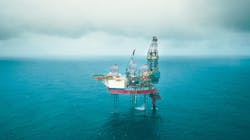Wintershall Dea initiates first CO2 storage in North Sea for Greensand project
Offshore staff
KASSEL and HAMBURG, Germany — Carbon capture and storage (CCS) will play a key role in mitigating climate change worldwide as well as in Europe. Denmark is leading the way and assuming a pioneering role among European countries with Project Greensand, as the first storage of CO2 in a reservoir in the Danish North Sea has been initiated.
Project Greensand ranks among the most advanced CCS projects in the EU, Wintershall Dea said. For the first time, the entire CCS value chain (capture, transport, and storage) will be implemented across borders.
By early April 2023, residual emissions from a Belgian industrial plant, collectively representing up to 15,000 tonnes of CO2, will be stored during the ongoing demonstration phase. The depleted Nini West oil field in the Danish North Sea will serve as a storage site for the CO2. By 2025/ 2026, 1.5 MMtonnes of CO2 could be stored per year as part of Project Greensand. In the final expansion phase, scheduled to begin in 2030, plans call for storing up to 8 MMtonnes of CO2 each year. This is more than 13% of the total annual emissions of Denmark. The main goal is to store the industrial emissions that it will not be possible to avoid in the future.
“Project Greensand marks a leap forward for the development of a Europe-wide CCS infrastructure and therefore for climate protection. We are showing that it is possible to capture, transport and store CO2 safely and reliably across national borders and the CCS technology will be able to contribute to a decarbonized tomorrow in the near future,” said Mario Mehren, CEO of Wintershall Dea, at today’s official ceremony for the first storage of CO2 in Esbjerg, Denmark.
Wintershall Dea is a leading member of the Greensand consortium. In addition to Wintershall Dea, the project is also being carried out by INEOS Energy in the role of operator. In addition, more than 20 other partners are involved, including startups, independent institutes, and the Geological Survey of Denmark and Greenland (GEUS), an institution within the Danish Ministry of Climate, Energy and Utilities. The Danish government is supporting the project with a total of €26 million ($27.4 million) in public funding.
Transporting the CO2 from Belgium and Denmark has been made possible by a bilateral agreement that these two countries concluded last year.
“If Project Greensand and other CCS projects in the North Sea are to be successfully implemented, policymakers must establish the appropriate regulatory framework,” said CTO Hugo Dijkgraaf, who is also a member of Wintershall Dea’s board of executive directors. “The first steps have been taken. Now we need more bilateral agreements to link emissions-intensive industries to CO2 storage sites in the North Sea.”
For Wintershall Dea, Greensand is a pioneering CCS project. Via CCS and low-carbon hydrogen projects, Wintershall Dea said it plans to annually avoid up to 30 MMtonnes of CO2 beginning in 2040. This represents a substantial portion of the residual emissions expected in Germany at that time.
03.08.2023
